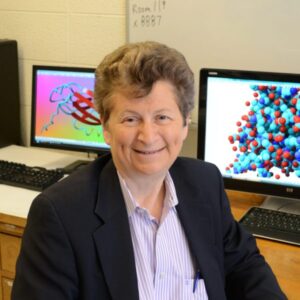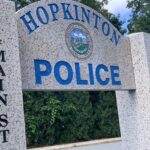Medical doctors and scientists from around the globe continue to work nonstop to understand, decipher and ultimately stop the COVID-19 virus. Hopkinton resident Dr. Mary Jo Ondrechen, along with a group of colleagues and students from Northeastern University, recently joined those ranks thanks to a fast-track grant from the National Science Foundation.
Ondrechen, a professor of chemistry and chemical biology at Northeastern, received the $165,808 grant to study the protein structures of the COVID-19 virus in order to identify ways to control its harmful behavior.
Ondrechen and her research group aren’t using beakers and test tubes, but instead computational methods to study protein molecules, including those from the virus, to identify their active sites. Once the active sites have been pinpointed, a binding inhibitor that will slow down or halt its activity can be applied and ultimately render the virus inactive. The hope is to find inhibitors with minimal side effects to patients.
The Northeastern group has the unique ability to apply artificial intelligence to locate sites not identified by other methods. These sites include pockets and crevices that serve as new targets for the development of antiviral agents. Large datasets of natural and synthetic compounds will be searched for molecules that fit into these alternative sites.

Mary Jo Ondrechen
The compounds that fit will be tested experimentally by Ondrechen’s colleague, Dr. Penny Beuning, also a Northeastern professor.
Due to the urgency of the situation and the importance of making the results known, Ondrechen explained the National Science Foundation has a mechanism in place for fast-track grants concerning time-sensitive studies called Rapid Response Research (RAPID).
Consequently, when it came to applying for the funding, Ondrechen and her group had some fast-tracking of their own to do.
“We submitted a rapid proposal that was very time sensitive,” she explained. “We received the email concerning the grant application on April 14 and we scrambled to get it done by April 17. We finished it just in time.”
Not long after the proposal was submitted for consideration, the group received word that it had received the funding.
Ondrechen noted the group doesn’t have to follow the usual path of disclosures and patent protections that come with such research studies, therefore prolonging the announcement of the results.
“Because this is an emergency, I signed a pledge that we will submit our results in preprint form immediately so that everyone can know what we find,” she said.
As a result, Ondrechen and her group continue their work around the clock.
“Well, actually I have to sleep, but my computer doesn’t stop,” she said. “We’re joining hundreds of scientists around the world who are working on this nonstop. We’re here because we want to help, and the NSF has been wonderful in addressing this serious problem.”
Although thousands of cases of COVID-19 continue to be diagnosed in Massachusetts each week, a recent downward trend is showing some signs of hope.






















0 Comments